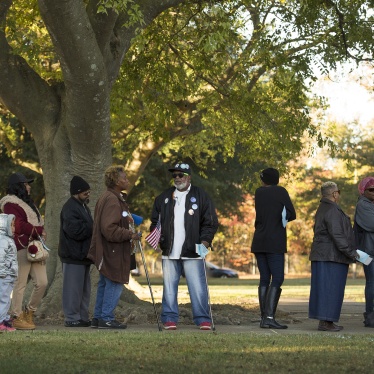H.R. 10, the 9/11 Recommendations Implementation Act, is moving through the U.S. House of Representatives toward a vote before Congress adjourns on Friday, October 8. Human Rights Watch was invited to speak at a press conference yesterday on Capitol Hill, organized by Rep. Ed Markey, focusing on the provisions of the legislation that would authorize the outsourcing of torture. HRW’s statement emphasized the principle at stake – the absolute prohibition on torture. It also responded to unfounded arguments made by proponents of the provisions who believe that sending people back to countries where they face torture is both lawful and necessary.
H.R. 10, the 9/11 Recommendations Implementation Act, is moving through the U.S. House of Representatives toward a vote before Congress adjourns on Friday, October 8. Human Rights Watch was invited to speak at a press conference yesterday on Capitol Hill, organized by Rep. Ed Markey, focusing on the provisions of the legislation that would authorize the outsourcing of torture. HRW’s statement emphasized the principle at stake – the absolute prohibition on torture. It also responded to unfounded arguments made by proponents of the provisions who believe that sending people back to countries where they face torture is both lawful and necessary.
Thank you, Representative Markey, for your principled stand against torture, and for inviting me here today on behalf of Human Rights Watch to stand with you and others in the human rights and humanitarian communities in opposition to Section 3032 of H.R. 10.
This provision calls upon us to choose between right and wrong. Torture is absolutely prohibited under both U.S. and international law. Along with 135 other countries that have ratified the Convention Against Torture and Other Cruel, Inhuman or Degrading Treatment or Punishment, the United States has committed itself to upholding this fundamental principle of human dignity. Just as governments cannot engage in torture directly, they cannot send people to places where they are likely to be tortured.
Yet the ban against torture finds itself under threat today. The House leadership’s 9/11 commission bill would authorize the outsourcing of torture to brutal dictatorships like Syria, Saudi Arabia, and China. If this provision were to become law, the United States could send a person to one of those countries even if it were 100 percent certain the person would be tortured. The U.S. government could even publicly ask a foreign government to torture someone on its behalf and that person would still have no protection against deportation. The 9/11 Commission, which said the United States should set an example of moral leadership, opposes this and other controversial immigration-related provisions in the bill. So does the White House, which has stated publicly that it opposes the provision on outsourcing torture. As President Bush has said many times, the struggle against terrorism must be waged with full respect for the non-negotiable demands of human dignity. Surely there can be no more fundamental principle of human dignity than the right to be free from torture.
But proponents of this measure have disregarded the President’s stated commitments. They argue that outsourcing torture is lawful and necessary. They are wrong on both counts. The law is clear: No one can be sent or returned to a country where they are likely to be tortured. The Senate embraced, without exception, this obligation when it gave its advice and consent to ratification of the Convention Against Torture. If the United States were to send or return a person to face torture, it would be in violation of its legal and moral obligations.
Proponents also suggest that the Department of Homeland Security would have to release a terrorist alien granted protection against return to torture. This is also untrue. Under current law, certain criminals or suspected terrorists who cannot be sent back to torture are denied lawful immigration status in the United States, can be deported at any time to another country where they do not face torture, and can be detained until deported. Congress also required detention of non-citizen terrorist suspects in passing the Patriot Act. Section 412 of the Act requires that non-citizen terrorist suspects certified by the Attorney General be detained until they are removed from the United States. Notably, the Justice Department has not needed to invoke this new authority. It told the Congress last year that it had not used the provision because traditional administrative measures had been sufficient to detain suspected terrorists.
Moreover, proponents suggest that the only choice is between release and deportation. But that ignores the fact that terrorist suspects in U.S. custody can and should be prosecuted for their alleged crimes.
In short, this provision of H.R. 10 would gut fundamental protections against being sent or returned to torture. It would undercut U.S. legal and moral obligations and send a horrible signal to the world at a time when the U.S. commitment to a world without torture has been questioned. In the wake of the prisoner abuse scandal at Abu Ghraib, President Bush and many members of Congress have gone to great efforts to show that the United States does not have a policy of condoning torture. If this provision becomes law, it will make outsourcing torture official U.S. policy. We must not let that happen.
See HRW’s work on the case of Maher Arar, a dual Canadian-Syrian national who was sent by U.S. authorities to Syria, where he credibly claims he was tortured in prison.




